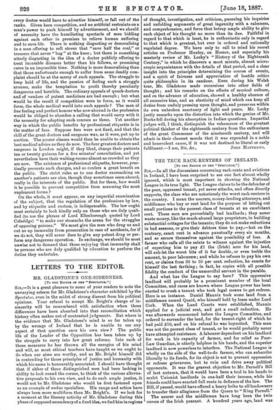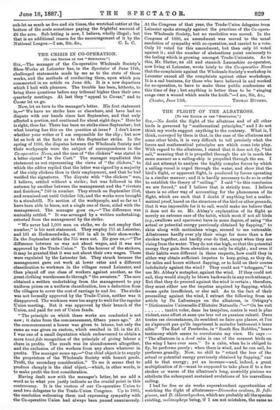THE TRUE RICK-RENTERS OF IRELAND.
[To TAZ EDITOR Or TH." SrZCTATOZ."] SIR,—In all the discussions concerning rack-rents and evictions in Ireland, I have been surprised to see one fact almost wholly ignored, which is most important in showing the National League in its true light. The League claims to be the defender of the poor, oppressed tenant, yet never attacks, and often directly supports, the class who are notoriously the worst rack-renters in the country. I mean the usurers, money-lending attorneys, and middlemen who buy or rent land for the purpose of letting out small portions to the poorest class of tenants at an exorbitant rent. These men are proverbially bad landlords ; they never waste money, like the much-abused large proprietors, in building substantial cottages for the tenants; they do not make reductions in bad seasons, or give their debtors time to pay,—but on the contrary, exact rent in advance punctually every six months, and so secure themselves against the possibility of loss. A farmer who calla all the saints to witness against the injustice of expecting him to pay 21 the (Irish) acre for his land, will sub-let the worst bits of it for double, or even treble the amount, to poor labourers ; and while be refuses to pay his own rent, or claims from 30 to 50 per cent, reduction, he exacts for himself the last farthing ; in fact, he copies with all possible fidelity the conduct of the unmerciful servant in the parable.
And what has the League to say here? This oppressive landlord will probably be a prominent member of the local Committee, and cases are known where League power has been exerted to crush a tenant who took legal means to get redress. Here is an instance. Daniel Mannix took some land from a middleman named Quaid, who himself held by lease under Lord Cork. When the Land Courts were established, Mannix applied for a judicial rent, and got a small reduction. He was afterwards summoned before the League Committee, and ordered to surrender the land, for the tenant-right of which he bad paid 250, and on his refusal he was boycotted. This man was not the poorest class of tenant, or he would probably never have attempted resistance. A labourer dependent on his landlord for work in his capacity of farmer, and for relief as Poor. Law Guardian, is utterly helpless in his hands, and the superior landlord is now powerless to interfere. The National League is wholly on the side of the well-to-do farmer, who can subscribe liberally to its funds, for its object is not to prevent oppression or redress grievances, but to ruin and drive away political opponents. It was the gravest objection to Mr. Parnell's Bill of last autumn, that it would have been a tool in his hands to mulct Unionist landlords in one-half their income, while his friends could have exacted full rents in defiance of the law. The Bill, if passed, would have offered a heavy bribe to all landowners to transfer their allegiance from the Queen to "King Parnell."
The usurer and the middleman have long been the twin curses of the Irish peasant. A hundred years ago, land was
sub-let as much as five and six times, the wretched cottier at the bottom of the scale sometimes paying the frightful amount of 26 the acre. Sub letting is now, I believe, wholly illegal ; but that is an additional reason for the encouragement of it by the National League.—I am, Sir, &a, C. L. C.



































 Previous page
Previous page